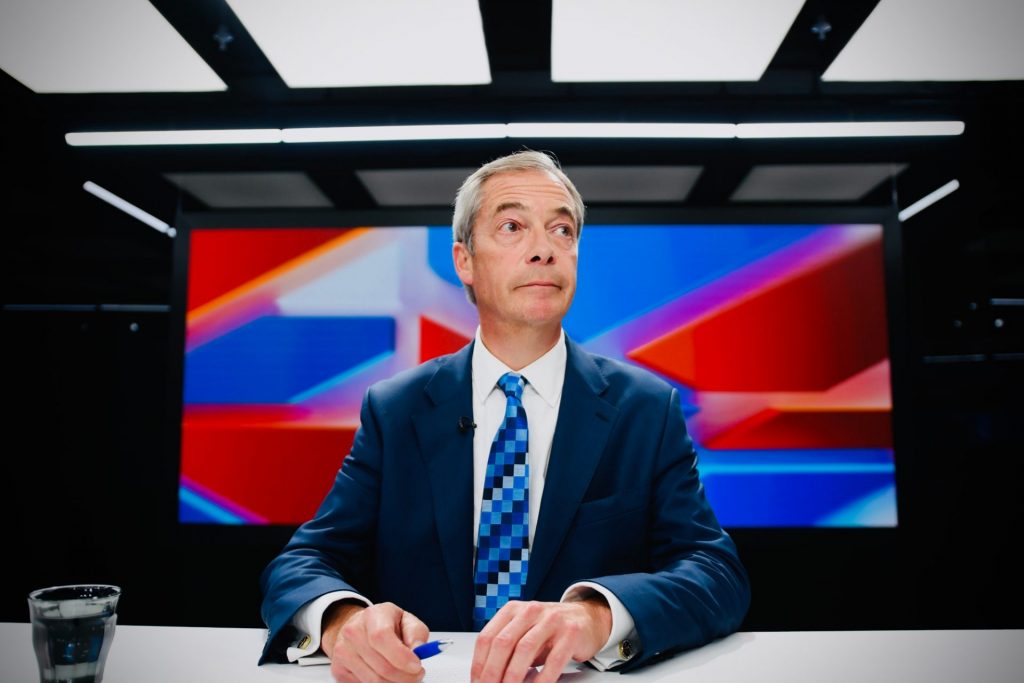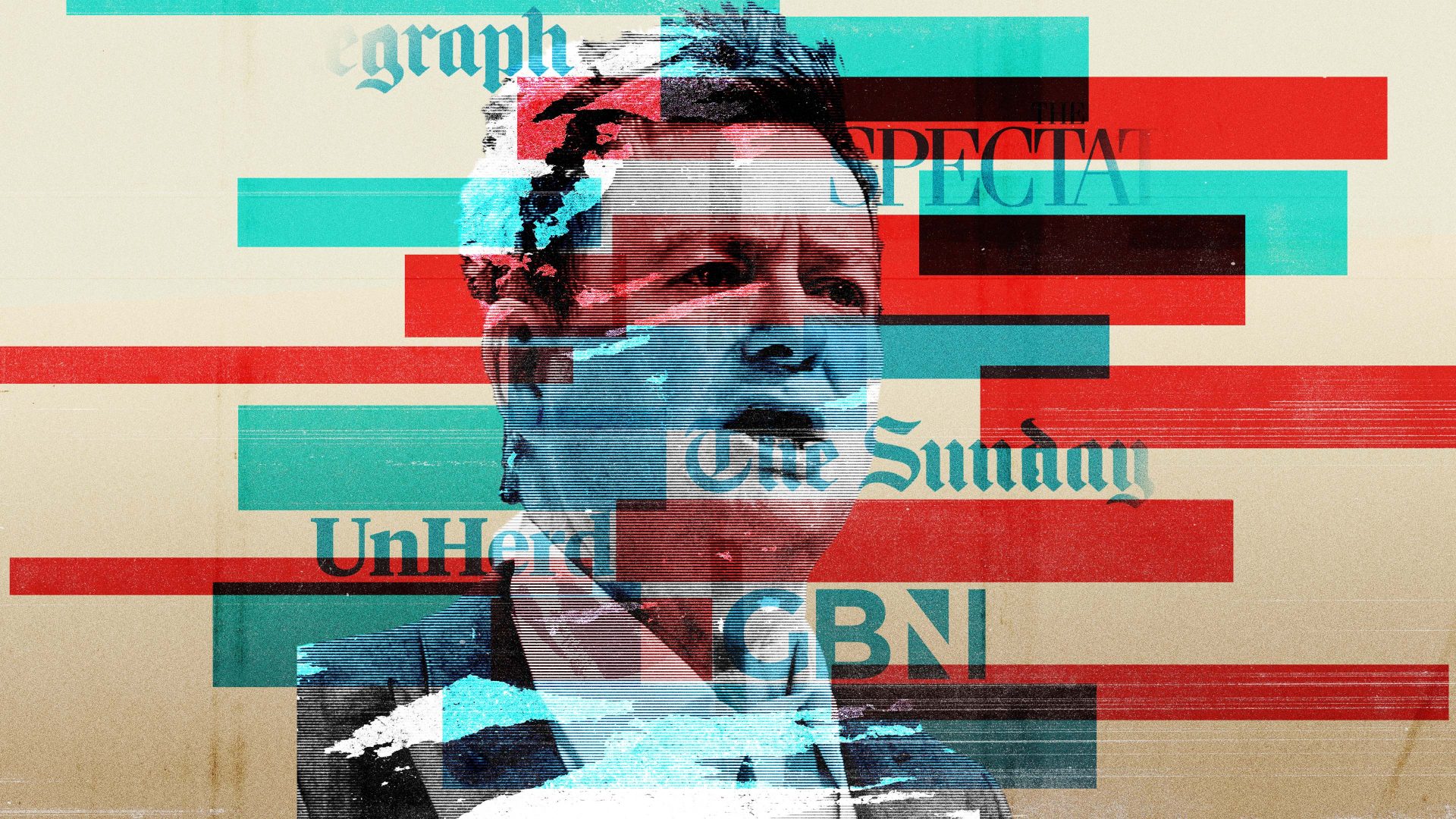To many of those who shared it, a scoop from the not-for-profit group HOPE not hate was as newsworthy as it was unsurprising. Paul Marshall, the man behind the GB News television channel and the UnHerd news site, a man who may soon become the new owner of those pillars of the Tory right, the Daily Telegraph and the Spectator, had a secret Twitter/X account that had liked some seriously hateful material.
Marshall appeared not to have tweeted anything offensive directly on his private account, but his likes included posts saying Muslims “came to conquer and replace British people”, others warning of “fake refugee invaders” or calling for “clos[ing] the borders” and “mass expulsions immediately”.
Such posts are overtly racist, Islamophobic and hateful, and few are likely to be convinced by the argument that liking a post is not necessarily endorsing it. It didn’t help when a few days after the revelations, Lee Anderson – the £100,000-a-year host of a GB News Friday night show, who also has a side hustle as an MP – was suspended from the Conservative Party for his Islamophobic rant about Sadiq Khan.
Given that Marshall’s GB News broadcasts a constant churn of conspiratorial and hateful content, those with only a passing knowledge of the multimillionaire might not be surprised by these views.
The reality might be more complex. Few who knew of Marshall 10 years ago would have expected him to end up where he is now. He was known mostly as an investor with an interest in philanthropy, aligned roughly with the Lib Dems, and only tangentially involved with British politics.
In the decade that followed, Marshall has engaged in a bizarre dance with Westminster, perennially trying to be both insider and outsider, never dealing with the contradictions of being both, and in effect “self-radicalising” (to quote one associate) over that time, as British politics has boiled in the culture wars imported from the US.
Marshall is perhaps the most significant UK media mogul to have emerged in the 21st century. In addition to GB News and UnHerd, he owns a private members’ club just a few doors down from the Spectator offices.
But rapid rises are often accompanied by rapid falls, particularly when governments change. The fortunes of Marshall’s new media empire are inextricably tied to the fortunes of the modern Conservative Party and its rivals on the right. Its survival may depend on whether or not it can untangle itself in time to avoid being part of the Tories’ impending electoral disaster.
Paul Marshall made his fortune – estimated at £630m – running a hedge fund. He was a co-author of the famous “Orange Book”, a title that gave its name to the Nick Clegg wing of the Lib Dems. While many thought of the Lib Dems – before the coalition era – as sitting to the left of Labour, the Orange Book tradition was socially liberal, but economically liberal, too – something akin to the political wing of the Economist.
Marshall’s split with the party came over Brexit – he was pro, they were anti. But Marshall did not suddenly rebound into some radical right figure overnight. Those who encountered him in that era recall his interest in talking about reforming philanthropic giving, or talking on educational issues. Marshall is a co-founder and trustee of Ark Schools.
Ark’s strict discipline and particular approach has earned it critics, but it is hard to paint the 39-school network as some project of the hard right: 40% of its pupils receive free school meals (versus 15% nationally) and around 70% are from an ethnic minority background (versus the 30% national figure). The charity also invests in charitable projects in lower- and middle-income countries.
Those who recall Marshall from that era suggest that he set himself on the road to radicalisation through a strange mix of the personal, his new business ventures, and the bizarre politics of our times.
One factor behind the change was religion, which was always one of his core driving forces. According to those who know him, Marshall follows a particularly evangelical brand of Christianity. This has been a big driver of his generally uncontroversial causes (such as Ark Schools), but also locates him within Britain’s current culture war, where issues of religion loom large. Religion explains why, until recently, one of the most prominent GB News presenters was Calvin Robinson, a dog-collar-wearing priest in the Nordic Catholic Church. It also explains his support for Conservative MPs of faith, including Danny Kruger and Miriam Cates.
His entrance into media, though, was hardly the stuff of the radical right – in 2017 UnHerd appeared with the Conservative commentator Tim Montgomerie as its launch editor. The site promised to promote arguments that were for people who were not part of the mainstream “herd”, a point that was reinforced by the presence on its logo of a cow.
The site attracted some early scepticism, mostly about whether a multimillionaire-backed site helmed by an establishment conservative like Montgomerie really represented under-represented voices.
But the site published respected writers, offered arguments from across the political spectrum (if largely centrist), and was known for paying generous freelance rates. It was hardly reshaping the British media, but had settled into the pack relatively comfortably.
It was Marshall’s next move – into television – that would prove far more controversial. What became GB News was conceived in 2019 and obtained a broadcasting licence from Ofcom in early 2020. The station brought Marshall in as a major investor later that year.
At the beginning, there were rival visions for GB News. Its first chairman and anchor broadcaster, Andrew Neil, conceived it as a thoughtful and moderate “soft” right counterweight to the perceived “soft” left wing bias of other broadcast media. Others in the company, notably the chief executive, Angelos Frangopoulos, wanted something far closer to the full-throated Fox News experience – UK broadcasting rules be damned.
This internal tension was still playing out when GB News launched in the summer of 2021. It soon became clear that the channel was not ready to be on air and had only started transmitting because it needed revenues to cover its colossal costs. But if Neil had hoped that Marshall would be on his side as a moderating voice, he was soon disappointed.
Several people familiar with Marshall, UnHerd, and GB News have said that events in his personal life had altered Marshall’s outlook on politics. The triggering incident centred on his son, Winston Marshall, who until March 2021 had been the lead guitarist in the hugely successful band Mumford & Sons.

The trouble started on social media, where Marshall Jr had praised a book from the right wing provocateur Andy Ngo, Unmasked: Inside Antifa’s Radical Plan to Destroy Democracy. Ngo is subject to sometimes exaggerated attacks from the left (including groundless claims that he helped to draw up target lists for violent far-right gangs), but his book genuinely repeats numerous alt-right and far-right tropes.
Given Mumford & Sons’ resolutely middle-of-the-road status as a band, the backlash was sharp and immediate. Winston Marshall initially did what many mainstream people do when called out online – he apologised, withdrew his recommendation, and said he would spend some time offline to learn more and address his “blindspots”.
Shortly afterwards, he changed his mind, reaffirmed his initial recommendation of the book and quit the band so he needn’t “self-censor” any longer. He has subsequently become an avowed “culture warrior”, hosting a podcast and YouTube channel on the subject.
The “cancellation” of his son fuelled Marshall Snr’s interest in the culture wars, and with Neil’s early departure from GB News left the channel with only one clear course, which it has relentlessly pursued – to showcase a parade of people offering up baseless Covid conspiracy theories, anti-vaxx rumours, dark theories about “15-minute cities” and discussion of the intrinsically Islamophobic “Great Replacement Theory”.
But to think of GB News as being on the political fringes would be to fundamentally misunderstand the channel’s strategy. It employs former cabinet ministers as presenters, as well as Conservative MPs and the former Ukip leader Nigel Farage. Boris Johnson is also producing a GB News series.
Since its launch, GB News has paid more than £660,000 to Tory MPs in appearance fees and salaries, although just £1,100 to Labour MPs.
The interview that led to former Tory deputy chair Anderson losing the Conservative whip was on GB News. His statements in the fallout of the scandal were first revealed by GB News presenters, and it was GB News that then revealed Anderson had been having what sounded like football transfer talks with the Reform Party leader and fellow GB News host, Richard Tice.
Broadcasters have often paid MPs as occasional contributors, sometimes controversially – Jeremy Corbyn received up to £20,000 for appearances on the Iranian state-owned channel Press TV, while George Galloway was paid by Russia Today and others while still an MP. But GB News’s paid relationships with MPs from the governing party is something new.
Marshall has marinated in the culture wars over the last few years, and like anyone who spends too long engaged in these issues has become visibly more extreme. But while right wing culture warriors rage against elites and insiders, Marshall is still desperately trying to become one.
UnHerd’s offices now also house an exclusive Westminster private members’ club, which is apparently doing reasonably well – even if a bog-standard bottle of French white costs £60. A recent visitor praised the atmosphere as “fairly buzzy” by Westminster standards. “The crowd was very Tory adviser,” they added. “Lots of red trousers.”
UnHerd’s editorial output is similarly torn between pieces by mainstream writers (I’ve written for it four times and appeared once on its podcast) and fringe pieces that attract condemnation. Its platforming and celebration of apologists for Russia’s invasion of Ukraine has attracted particular ire, prompting the author and journalist James Bloodworth – who had written regularly for the site – telling his social media followers: “Don’t write for UnHerd. Yes I did in the past. Big mistake. You’re being used as cover for Kremlin talking points.”
UnHerd’s output remains a mix of good-quality journalism, reheated culture war points (often from writers claiming to be cancelled elsewhere), and occasional outrageous pieces that should not be published. Some, like Bloodworth, think the good pieces are a deliberate tactic to lend credibility to the more propagandist articles, but it is much more likely that the site simply has a confused overall editorial direction.
That confusion could soon come to bite GB News, and hard. Barring a huge shock, the UK is heading for a change in government, and GB News will have to decide how to handle it. The chances of persuading Labour MPs to have a relationship with the channel are next to none. The appeal of semi-professional MPs as presenters, meanwhile, is likely to diminish if those MPs are no longer from the party of government but from a divided and fractious opposition.
Worse yet, Ofcom has been treating the channel with extreme caution – because it knows if it took decisive action it would face an immediate backlash from senior Tory MPs, who may put pressure on the incredibly weak PM to act against Ofcom. Such constraints will evaporate overnight when the Tories lose the election.
But on Monday the regulator ruled that remarks made by a former host on the channel, Laurence Fox, had breached rule 2.3 of the Broadcasting Code. The presenter had made “unambiguously misogynistic” comments about Ava Evans, a female journalist. Ofcom said as a result of the incident it had “significant concerns” about GB News’s editorial control of live output.
Right wing culture wars are a niche occupation in the UK – we are simply not like the Americans.
Ideologically charged arguments over race, culture and society appeal to a tiny fraction of the electorate – most people just want help with the cost of living, and public services that work a bit better. The reason culture war issues are riding so high is that the Tory Party leadership is scared of its own shadow, and even more scared of Reform UK, the party that revels in the same culture war slurry as GB News.
While Rishi Sunak is in power, niche hard-right grifters have managed to graft themselves on to the government. A Labour government would put a stop to that, too.
All of which means that Marshall’s strange insider-outsider era is probably coming to an end, and he may have to pick a side. Does he want the red-trousered party insiders, the member’ club, the status in the halls of power – or is it culture wars or bust? Does he hope to re-cast the mainstream Tory opposition in the shape of the GB News agenda – and would the party survive if it did?
As a potential owner of the Telegraph and Spectator, Marshall could have more influence over the right of British politics than any man since Rupert Murdoch. But while Murdoch famously always saw politics as a means to fuel his business, Marshall isn’t in the media industry to make money – he has already made his.
Change is coming. Marshall may come to own the British right and shape the Conservative Party – only to guide it to electoral opposition. He may find that his insider influence simply disappears. Or there may be another reinvention in him yet. What might he be in five years’ time?




